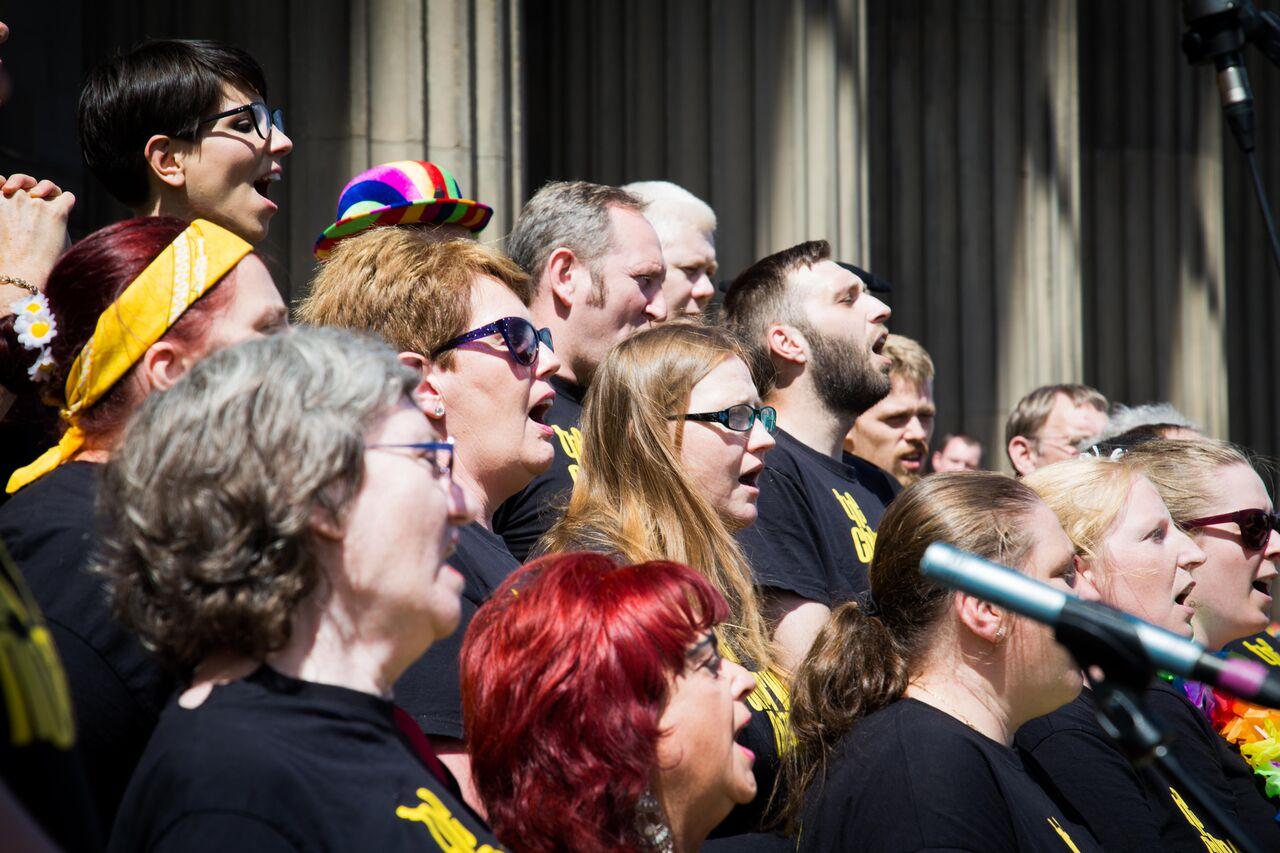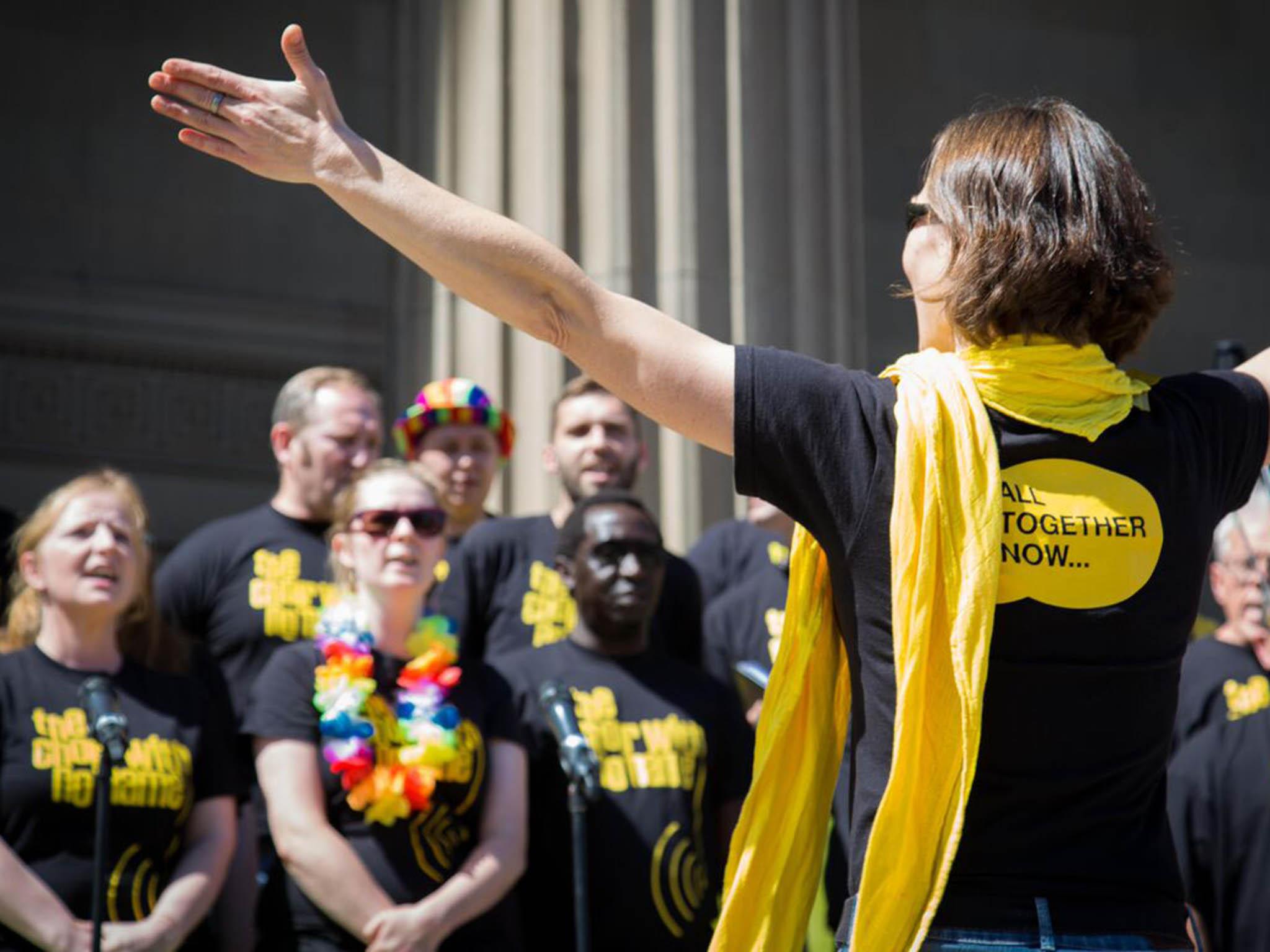The Choir With No Name gives hope to the homeless
One charitable choir is proving that music really can change lives

Sleeping in shop doorways, selling copies of the Big Issue or drifting between hostels and women’s refuges isn’t how most performers begin telling the story of how they came to be on stage at the Royal Festival Hall.
But for many of the singers in the Choir With No Name – a choral group for homeless and marginalised people – these stories were, and still are, a reality.
In the midst of a worsening homelessness crisis, with the number of rough sleepers in England doubling since 2010, the Choir With No Name is one of a growing number of creative charities in the UK that work to empower people to reintegrate with society through performing arts.
Set up nine years ago by gospel singer and former St Mungo’s worker Marie Benton, Choir With No Name groups in Birmingham, Liverpool and north and south London provide a safe space for people to go every week. The non-religious choirs operate an open-door policy: organisers pride themselves on having no waiting list or joining criteria, which they say couldn’t be further from the experience of using the housing system.
While members are practising rock, pop, soul, gospel and reggae songs – which could be anything from anti-Apartheid number “Something Inside So Strong” by Labi Siffre to “Don’t You Worry Child” by Swedish House Mafia – volunteers cook the singers a hot dinner and are on hand to listen to any issues they may be facing or provide information on how to access local services or find college courses.
The choir – which has 173 regular members, as well as attracting around 800 more non-regulars and ad-hoc workshop attendees last year – has to date performed in prestigious venues such as London’s Royal Festival Hall, the Brighton Dome, St George’s Hall in Liverpool and the Birmingham Symphony Hall. They also do weddings.
“There have been so many transformations,” says Sally Debiage, who manages the Birmingham choir, the biggest of the four groups. “One of our members struggles with drinking. Last year we were doing 'Bohemian Rhapsody' – you know what a challenging song that is – and he was going to be perfect for the lead soloist.
“He stuck with us over four months to learn it and he stole the show with this amazing vocal. He said to me that if it wasn’t for that solo part we wouldn’t have seen him because he would’ve been sat drinking – but it kept him going, knowing he had to keep coming week in week out to learn it.
“It’s that support that everyone gives each other, and that respect. They call each other family. It’s pretty incredible.”
The Birmingham group also works with other local organisations whose members have been affected by homelessness or other issues; they recently put on a workshop for recovering addicts via Changes UK.
“You hear about drugs in rock bands”, laughs Stef Carolan, who sings with the north London choir. “But not in choral groups.”
Stef says singing with the Choir With No Name has helped him beat addiction to heroin and crack cocaine. Having grown up in care, he “spent a few years going in and out of prison for theft and shoplifting” and found himself living in a recovery hostel, where he heard about the choir through word of mouth.
“Singing was one of the only things I enjoyed; I didn’t need to take drugs to do it. It gave me a focus to redirect my life. It’s given me the impetus to not go back, because it feels like there’s too much to lose. And now there’s too much that’s good in my life to be negative. To go back would be foolish. It’s the sense of achievement, doing something for yourself as well as a group.

“It’s a bonding thing, it’s more than singing, it’s a community, and for me that’s really inclusive. That feeling where people don’t want to be around you – you don’t get that feeling there. Everyone’s there for the singing, and if you’re there to sing everyone gets on. That’s really refreshing. It’s definitely the highlight of my week.”
Stef has not taken drugs since October 2016 and is training to be a flower arranging demonstrator for the National Association of Flower-Arranging Societies. “The self-belief and reinforcement it helps give you makes you believe you can achieve anything, and it’s so important to have people like that around you,” he adds.
A survey of members in 2016 found that 60 per cent of the singers had begun volunteering, been employed or found secure housing since they joined. Ninety-six per cent say their confidence has increased, while 76 per cent reported an improvement in their mental health over the past year.
According to Crisis, 70 per cent of people who use homelessness services in England have mental health needs.
A number of studies have confirmed that singing with a choir helps to improve both physical and mental health. Professor Graham Welch, Chair of Music Education at the UCL Institute of Education, has spoken about the positive physical, psychological and social effects singing in a choir has on people, while a study by the Oxford Health NHS Foundation Trust and Oxford Brookes University, published last year in the Psychology of Music journal, found that singing in a choir boosted psychological wellbeing, because it gave members a sense of being part of a “meaningful” social group.
Mina Tilt has been a member of the Birmingham choir since January 2012. Having experienced 18 months of homelessness in her early 20s after escaping domestic violence with her two-year-old son, sofa-surfing and spending time in a women’s refuge, she was close to losing her home for a second time as she struggled financially after her second husband Ian died. She then found Choir With No Name.
“It doesn’t matter what’s happened during the week, you really feel like you’re part of something and you’re supported. It really has built my confidence. You can see the difference in people week-on-week. It’s my rock through life, the one thing I can count on is choir on a Thursday night.
“I was coming out of a long period of mourning and grief,” says the well-spoken soprano, who is now studying for a postgraduate degree in Quakerism at Lancaster University while working as a retail assistant and an admin assistant. “It’s about developing better self esteem and more confidence. It’s like a great big family. You’re absolutely accepted, as you are, where you are at that time. You’re not judged.
“People have an image of somebody who’s homeless.We really break down barriers and people’s perceptions about what a homeless person is and what they’re capable of. There’s a perception that it’s your fault, and often people find themselves homeless for all manner of reasons that are not necessarily something they’ve done, it’s just the circumstances in their life. It could happen to any of us.”
Find out more about The Choir With No Name and their latest ‘All Together Now! 2017’ fundraising campaign at choirwithnoname.org
Join our commenting forum
Join thought-provoking conversations, follow other Independent readers and see their replies
Comments
Bookmark popover
Removed from bookmarks